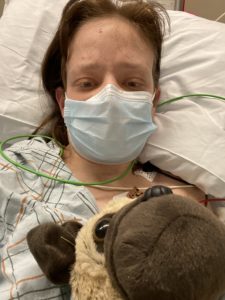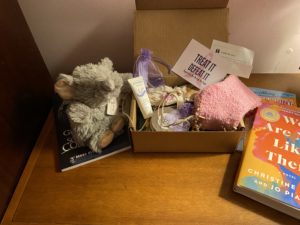Coping | Daily Life

An image of the blog author (a women with brown hair laying in a hospital bed wearing a surgical mask and holding a stuffed animal) during her recent post-surgical hospital stay.
Social media is often viewed as a source of negative energy. It is blasted for destroying the social development and body image of teenagers, leading to higher rates of depression, and rapidly spreading misinformation and conspiracy theories. Self-care campaigns often encourage us to unplug from social media or even deactivate our accounts.
Nevertheless, social media’s destructive impact on society is only part of the picture. Social media has the power to bring people together and help them through hard times. I never thought I would turn to social media for help with my chronic health conditions, but doing so turned out to be my savior.
I do not remember the first illness-related group I joined or the post I made (It took me months after joining groups to make posts), but the people I have met are a significant part of my daily life. Chronic illness is isolating, especially when you are young and do not know anyone else with your condition. Throughout the first two years of my serious illness, I felt as though I was on an island by myself. My family and friends who knew about my illness were supportive (thank you), but they were not walking in my shoes. There were many details about my disease, medical tests, and hospital stays that I did not feel comfortable sharing with anyone.
I yearned to connect with other young chronic illness warriors, but most monthly support groups were at least an hour away and I knew I would be too shy to say anything in front of a large group anyway. Nevertheless, my yearning to connect with other warriors led me to drive an hour and a half through the pouring rain one Sunday morning to a support group. My heart sank when I entered the room and realized I was the only person under 65. I plowed through with a smile plastered on my face to hide my disappointment.
Don’t get me wrong; this group was filled with many amazing people with wise insights and advice, but I wanted to connect with people who understood what it was like to have your own body try to tear you down when you were just beginning to build yourself. I came home from this in-person meeting feeling defeated. With my pre-existing depression and anxiety raging like never before, I called my insurance and connected with a therapist.
Therapy can be a significant source of support for many people and I encourage anyone in need to seek psychiatric help. I had an amazing social worker who took the time to research IBD and ostomies before my first visit. Her holistic approach and emphasis on meditation provided an excellent supplement to the western medicine that was the focus of all my other appointments.
Nevertheless, I remained isolated. There was no amount of meditation or anxiety reduction strategies that could fill my desire for a genuine connection with someone who could understand me firsthand.
Then, while browsing the internet one sleepless night, I stumbled across a Facebook Page for Girls with Guts. I liked the page and joined the private support forum thinking it would just be another group I would visit from time to time to feel less alone.
I had no idea how my life was about to change.
Within a few months of liking this page, I became an active GWG volunteer and began connecting with amazing women from around the world. I eventually joined a group chat with four other Girls with Guts. What started as a method for communication among this group of volunteers blossomed into the most amazing, beautiful friendship I have ever experienced.
The five of us message each other every day to check in and share our daily triumphs, success, blunders, epic fails, anxiety, frustrations, and tragedies. We laugh, cheer, and cry with each other through our computer and cell phone screens. Our group is a safe place. It is one of the few communities I have felt comfortable completely letting down my guard and exposing my true self. I discuss medical challenges and fears without feeling like some kind of exotic freak and I make lame jokes without worrying about coming across as gross or weird. I mean, I would not send a text about the pros and cons (mostly cons) of throwing up in your mask at work to anyone else. When I say that I love these amazing women; I mean it.

Image of care packages (stuffed animal, self-care items, a book) the author received during her recent post-surgical recovery.
My fellow GWG sisters have not merely delivered me from Isolation Island; they have given me a sense of comfort, security, and confidence I have never experienced. This past fall, I was diagnosed with a large pheochromocytoma in my right adrenal gland (an extremely rare active tumor that secretes excess hormones). Additional imaging revealed liver lesions and inflammation. It took three months of appointments, CT scans, MRIs, blood draws, phone calls, and a PET scan to rule out metastatic cancer and schedule in-patient surgery to remove the tumor and adrenal gland. My surgeon informed me that this will require lifelong follow-up because these tumors have a tendency to come back on the remaining adrenal gland.
A few years ago, this added diagnosis would have broken me. But I am not the same person I was then. I have a powerful group of friends at my side. I am able to cope with a fast-approaching in-patient surgery in a New York City hospital despite the rising rates of COVID and reports of understaffed hospitals.
I know that the road ahead will not be easy, but I simultaneously know that I have some amazing people at my side. Our circumstances might vary, but we all understand the chronic patient life. I have social media to thank for this. This highly criticized venue (often rightfully so) has given me the precious gift of friendship.
*This blog is intended to highlight one of the most powerful friendships I have ever had. I hope that I have made it clear that I am not criticizing my other friends or family who have shown me tremendous support throughout my journey. I use the term ‘isolation’ to describe the way I felt as a young adult with chronic illness. I am not implying that I did not have anyone or that my friends and family were not helpful (they are amazing). It is just that the void I felt could only be filled by other warriors*
